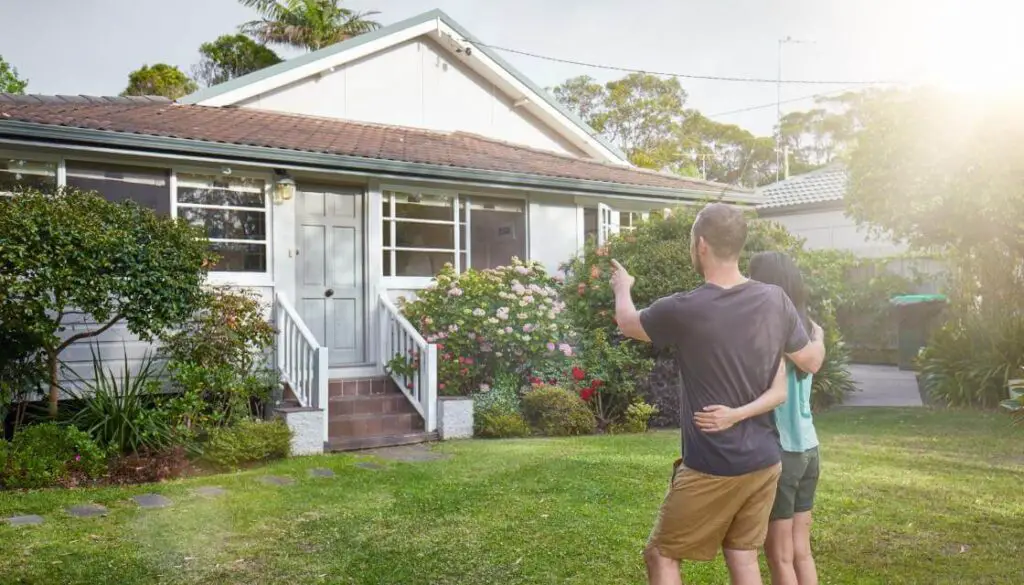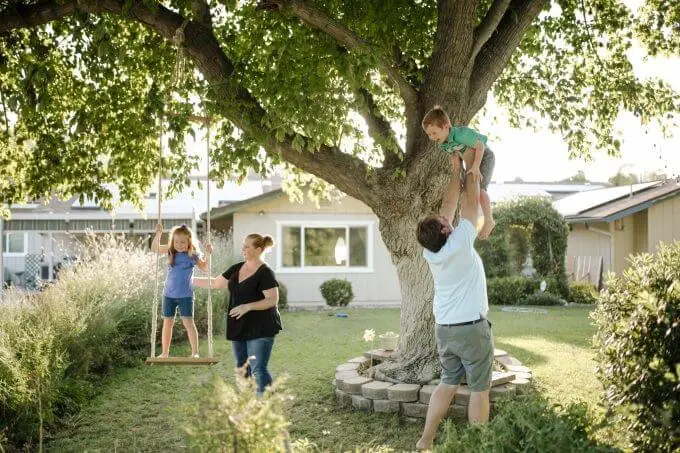Last Updated on August 6, 2023 By Emma W. Thomas
The number of people that can live in one house depends on several factors such as municipal and state zoning laws, your house’s square footage, the age of the occupants, and the sewage system limitations. But as a general rule, each bedroom can accommodate 2 + 1 people.
How Many People Can Live In A House?
| House Size | Number of People |
|---|---|
| Studio | 1-2 |
| 1 Bedroom | 1-2 |
| 2 Bedrooms | 3-4 |
| 3 Bedrooms | 5-6 |
| 4 Bedrooms | 7-8 |
| 5 Bedrooms + | 9+ |
The number of people that can comfortably live in a house depends on the size and layout of the property. Here is a table that provides a general guideline on how many people can live in a house based on the number of bedrooms:
- Studio: A studio is typically designed for one or two people, as it usually consists of a single room that serves as both a living area and a bedroom. It is ideal for a single person or a couple.
- 1 Bedroom: A one-bedroom house is suitable for one or two individuals. It usually includes a separate bedroom, a living area, a kitchen, and a bathroom.
- 2 Bedrooms: A two-bedroom house can comfortably accommodate three to four people. It provides space for a couple or small family with one or two children. The additional bedroom allows for more privacy and flexibility.
- 3 Bedrooms: A three-bedroom house is ideal for medium-sized families. It can comfortably house five to six individuals, including couples and children. The extra room can be utilized as a guest room or a home office.
- 4 Bedrooms: A four-bedroom house provides ample space for a larger family or for individuals who require extra rooms for various purposes. It can accommodate seven to eight people, allowing for more flexibility and privacy for each family member.
- 5 Bedrooms and above: Houses with five or more bedrooms are suitable for larger families or individuals who require additional rooms for specific needs. These houses can accommodate nine or more people, providing space for multi-generational families, extended families, or individuals with specific lifestyle requirements.
It is important to note that these numbers are general guidelines and can vary depending on other factors such as the layout and size of the bedrooms, the availability of common areas, and personal preferences for space allocation. It is essential to consider the specific needs and lifestyle of the residents when determining the appropriate number of people who can comfortably live in a house.
Number Of People In A House As Per 2+1 Rule

| Number Of Bedrooms | Number Of Occupants |
| One | Three |
| Two | Five |
| Three | Seven |
You can apply the 2 + 1 rule when deciding the number of persons who can live in a house. However, this rule will only hold if your house has enough space for each occupant to have 165 square feet. For example, a bedroom measuring 11 x 15 feet can hold one person, while that measuring 15 x 22 feet will accommodate two people.
Can A Family Of Four Live In A One-Bedroom House?
A family of four may not fit in a one-bedroom house going by the 2 + 1 rule. According to this standard rule, a one-bedroom house should hold a maximum of three people, i.e., a minimum of two people plus one extra.
While a landlord/landlady may not discriminate against you based on your family size, he/she can regulate occupancy. Besides, the neighbors may not put up with the noise from children as far as quiet conduct is concerned. Uncontrolled noise from children may lead to a violation of the lease agreement.
Can My Landlord Limit Occupancy?
Yes. A landlord can regulate the number of people living in a house. House occupancy requirements depend on several factors, among them state and local zoning laws. The sewerage system and the square footage of your house also play a role in the number of people who will live in a house.
If the landlord hints to you that your house is overcrowded, it is high time to look for a larger space. You can look for programs that support people with low income to get accommodation if you fall into this class. Some programs assist people in getting discounted mortgage insurance.
Zoning Requirements For Renting A House
If you are a landlord and are willing to rent your home to tenants, you need to know your area’s zoning rules. It is necessary to get your property insured, decide the amount to charge and which utilities you will pay.
The Following Zoning Rules Are Worth Considering:
Homeowners Associations Rules
If your property is located in a community with HOA (Homeowners Association), find out about the provisions of renting out your house. There may be guidelines to be followed, and you need to know them to avoid fines. Read the bylaws carefully and seek clarifications from the HOA, if any.
Your City’s Regulations To Landlords
Check if your municipal or city has regulations for landlords and adhere to them. It is also vital to know your area’s zoning ordinances or requirements before you decide on renting your property. Make sure that you follow the ordinances strictly to avoid risking your financial future.
Number Of Occupants In Your House
One of the main zoning regulations is the number of people your house can hold. A one-bedroom in a rental house should accommodate two people in most locations unless they are children below two years. For example, a married couple with a kid under two years can rent a one-bedroom house. But if the child is above two years, the couple should go for two bedrooms or more.
If One Has A Home Business
Before giving out your home for renting, it is necessary to know if the tenants have home businesses. It would help if you let your tenants know the business activities they can or can’t carry out in your premises. Ensure that there are no zoning violations by putting home business information in the agreement they will sign.
By knowing what businesses your tenants engage in, you will avoid zoning problems brought about by such activities.
Tenants Having Pets
Make sure that you know if your tenants keep dogs or other pets in your premises. Having pets may contravene zoning requirements, and this may cause you to pay fines. You may also find yourself fighting a lawsuit for what your tenants are doing.
If you allow your tenants to keep pets, especially dogs, ensure that you know their breeds and how many they are. Ensure that you also put it in writing as part of the contract.
How To Choose The Size Of Your House

Before building, buying, or renting a house to live in, several factors need to be considered. You don’t want to make a mistake that may be difficult to correct in the future. The following tips will help you to make an informed decision:
The Current Number Of People In Your Family
The number of people currently in your family plays a major role when deciding on the number of bedrooms. For example, if you have two children in a family of four, each child may need a separate bedroom, and a four-bedroom house will be ideal.
Whether Your Family Will Increase
In case you plan on having more children, it is okay to have a house with additional bedrooms. Ensure that you factor in the extra space so that you don’t get inconvenienced in the future.
Is There A Need For A Guest Bedroom?
If you normally host friends or family members in your house for a long time, you may consider having an extra room. Your guests don’t have to inconvenience you, and that is why it is wise to have a bedroom set aside for them.
Will You Work From Home?
Do you work from home?, then you may need an extra bedroom to serve as an office. Make sure you have this in the plan before building your home.
Whether You Will Take Care Of Your Aging Parents
If you plan to take care of your aging parent at some point, then you will need an extra bedroom for them. You may also be planning to live with an elderly relative, which requires you to build a home with extra space.
References:
https://www.realestatewitch.com/how-many-people-can-live-in-a-house/
https://libertas.org/toolkit-topic/how-many-people-can-live-in-a-house/
Emma is a graduate of Domestic Science or Family and Consumer Sciences (Home Economics) from the University of Wisconsin. She has 7 years of experience Working with the strategic section of BestBuy and now writing full-time for Homeeon.
From Managing the Home, Interiors, Cleaning, and Exteriors to Gardening and everything about Making A Home Liveable – is her passion and this Homeeon is the result of this.
Emma loves decorating her home with the best stuff found online. She cares about quality over anything and writes reviews about them here in Homeeon. Get in touch with her over Pinterest.
Keep reading her blogs.

